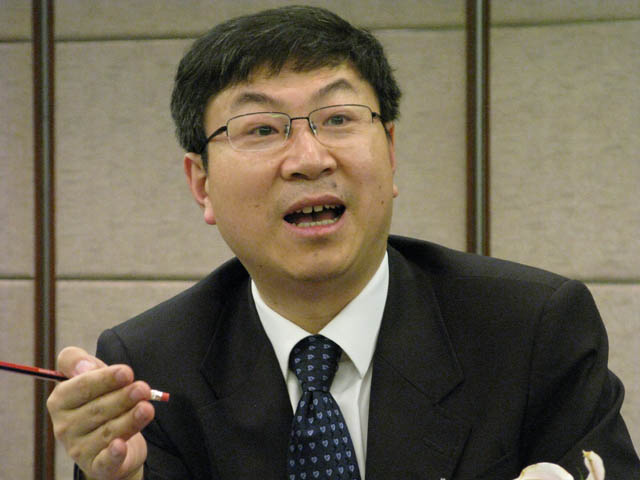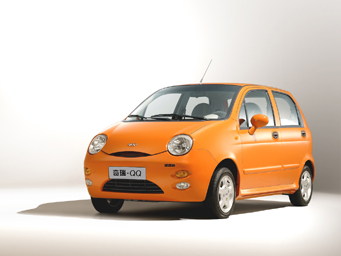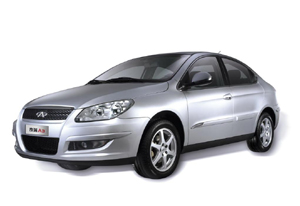Chery Automobile of China to Set Up Assembly and Export in Taiwan
2009/06/02 | By Quincy LiangChina's new car sales earlier this year eclipsed that in the U.S., formerly the biggest car market worldwide; all the established carmakers have set up affiliates and partnerships in China, helping also to build a vast supply chain of OE (original equipment) parts makers; the per-capita car ownership in China still lags far behind those in developed nations, all indicating the most populous country has enormous potential to lead the world in car ownership.

The automotive industry in China just had its gas pedal pressed further recently: T.Y. Yin, chairman of the Chery Automobile Co., the largest independent carmaker (excluding technical partnership with foreign car brands) in China, announced at the 2009 Shanghai International Auto Show (Auto Shanghai) to some reporters from Taiwan that it would soon set up operations in Taiwan, turning out some models and sourcing more than 60% the needed parts locally.


Chery plans to tap the small Taiwanese car market by the end of the year, teaming up with a subsidiary of the Prince Motors Co. (local assembler of Suzukis). In addition to the Chery A3, the first model to be marketed on the island, the Chinese carmaker aims to produce light commercial vehicles for local and export sales.
Interviewed by a reporter of the Taiwan-based Chinese-language newspaper Economic Daily News (EDN), a CENS affiliate, Yin confirmed that Chery's assembly plant in Taiwan would also be its export base in the future.


4-star Safety
Staunchly defying occasional reports of shoddy China-made goods, Chery cars to be sold in Taiwan will be safety-approved by the C-NCAP (China New Car Assessment Program) to at least 4-star standards, coupled with the best warranty in the segment: four years or 120,000 kilometers.
In addition to the A3 mini car and another light commercial vehicle, Yin said that Chery would also evaluate the viability of introducing the Chery Riich G5 and G6 sedans, unveiled at the Auto Shanghai 2009, into the Taiwanese market.
Commenting on Chery's move to set up car assembly in Taiwan, Kenneth Yen, CEO of Taiwan's largest carmaker the Yulon Group, said that such deployment is inevitable, just as Taiwan-based automakers and parts suppliers would tap the huge market in China.
Upbeat About Next 20 Years
Asked about his outlook on the automobile market, Yin expressed his unwavering optimism towards car sales in China over the next 20 years. The chairman backed his rosy view by stating that new car sales in China are up, driven by official economic-stimulus and industry-development promotion policies since late last year, including subsidies for new cars sales in rural areas and tax breaks, repeating that China replaced the U.S. the world's largest car market in the first quarter. With new-car sales stateside still sputtering, and that in China continuing to churn ahead, Yin said, China is very likely to become the biggest car market globally in 2009.
Consumer confidence is the deciding factor in automobile sales, Yin said. People buy new cars when feeling confident of the overall economy, but it does not matter much if purchases are delayed a little. Regardless, Yin highly praised the Chinese government's various measures to bolster new-car purchase willingness.
The relatively low car ownership in China fuels Yin's upbeat view of the car market in China over the next 20 years: only 40 cars are registered for every 1,000 Chinese, far shy of the 780 stateside, or even the 200-plus in neighboring Russia, revealing the huge growth potential in China. Yin's optimism is further strengthened by the rising affluence in China, with the gross domestic product (GDP) approaching the threshold allowing typical families to afford cars. Hence there is one less hurdle to clear to build the automotive industry in China, he said.
Acquisition Averse
Not only a maverick for being the first officially-approved private carmaker in China, Chery, established in 2002, has been locked in overdrive in its rapid expansion: having sold over a million vehicles in only five years, becoming the seventh-largest automaker in China in 2008.
Commenting on Chery's possible acquisition of foreign automakers, Yin said that his observations indicate that most such acquisitions do not achieve benefits, instead create new problems. Different corporate cultures in various nations make transplanting success cross-borders a fine art, he said, which can often turn a BMW at the original maker into a Pinto at another.
Yin quoted a recent example in China's automotive industry that Shanghai Automotive Industry Corp. (SAIC) acquired SsangYong Motor of South Korea but lost almost everything. "So we don't have a very high anticipation toward the acquisition of a foreign automaker," Yin said. "In my opinion Chery should continue to expand only by ourselves. Strength and capability should not be bought but all self-developed."
Regarding the Chinese government's policy to further consolidate the automotive industry, aiming to integrate the 14 existing automakers, now dominating over 90% of the domestic market, into 10 in three years to pool resources and strengths, Yin said that overcapacity has been a problem in the Chinese automotive industry, and many smaller players lack the ability to achieve economy of scale.
According to the chairman, the new integration policy requires the top-eight automobile conglomerates (FAW, Dong Feng, SAIC, Changan, Beijing Automobile Works, Guangzhou Automobile, Chery, and China National Heavy Duty Truck Group) to take over the smaller players. Chery is carefully evaluating such policy and is looking for potential partners in neighboring regions, Yin said.
Field-tested Safety
To shatter the stereotype that China-made cars are unsafe, Yin said that Chery has been improving its quality level and showing test results to the public.
After adjusting its tactics in 2007, Chery began a series of quality tests and announced the results to the public through media, including 100,000 km non-stop driving and inspections of disassembled key parts at a famous university laboratory, as well as allowing vehicle-safety testers randomly buy a newly launched model for testing according to C-NCAP standards. Chery's new sedan has been five-star approved in such collision tests.
Further stressing world-beating safety and quality, Yin said that average cars sold globally are three-star approved, while Chery now only markets cars with at least four-star safety standards. And the Chinese automaker's four-year or 120,000 km warranty, the best in the field, underlines Chery's confidence in its product quality and durability.
Chery's efforts in safety improvement has been fruitful: Monthly sales of the A3 mid-sized sedan launched in late 2008 has been a steady 7,000-some units for several months, despite its much higher price than same-class counterparts due to upgraded quality.




